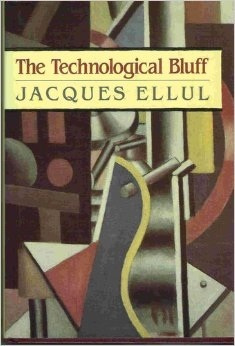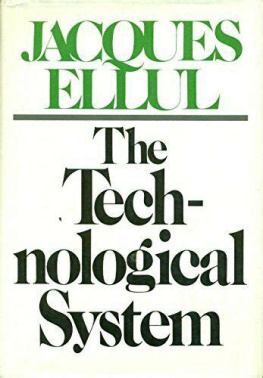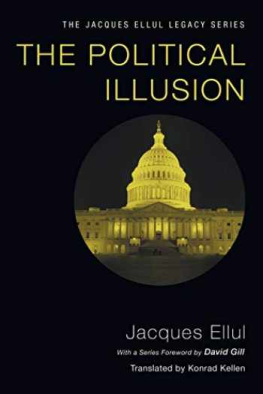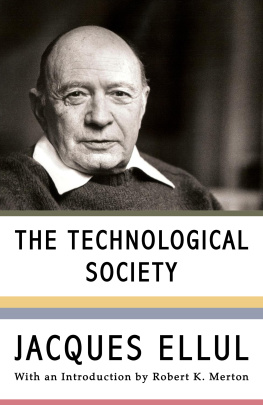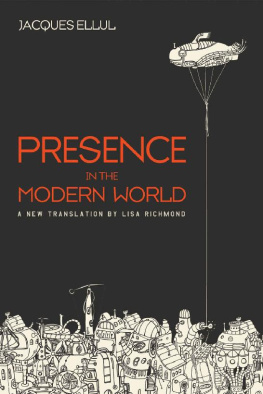Jacques Ellul - On Freedom, Love, and Power
Here you can read online Jacques Ellul - On Freedom, Love, and Power full text of the book (entire story) in english for free. Download pdf and epub, get meaning, cover and reviews about this ebook. year: 2015, publisher: University of Toronto Press, genre: Religion. Description of the work, (preface) as well as reviews are available. Best literature library LitArk.com created for fans of good reading and offers a wide selection of genres:
Romance novel
Science fiction
Adventure
Detective
Science
History
Home and family
Prose
Art
Politics
Computer
Non-fiction
Religion
Business
Children
Humor
Choose a favorite category and find really read worthwhile books. Enjoy immersion in the world of imagination, feel the emotions of the characters or learn something new for yourself, make an fascinating discovery.

- Book:On Freedom, Love, and Power
- Author:
- Publisher:University of Toronto Press
- Genre:
- Year:2015
- Rating:5 / 5
- Favourites:Add to favourites
- Your mark:
- 100
- 1
- 2
- 3
- 4
- 5
On Freedom, Love, and Power: summary, description and annotation
We offer to read an annotation, description, summary or preface (depends on what the author of the book "On Freedom, Love, and Power" wrote himself). If you haven't found the necessary information about the book — write in the comments, we will try to find it.
This expanded edition of Elluls talks features additional material, previously unavailable, that focuses on Christianitys potential service to humanity as a community that exemplifies a society where people are reconciled with one another and with God.
On Freedom, Love, and Power — read online for free the complete book (whole text) full work
Below is the text of the book, divided by pages. System saving the place of the last page read, allows you to conveniently read the book "On Freedom, Love, and Power" online for free, without having to search again every time where you left off. Put a bookmark, and you can go to the page where you finished reading at any time.
Font size:
Interval:
Bookmark:
Any attempt to understand the first few chapters of Genesis immediately confronts us with a number of problems. For starters, there are two creation stories: there is the account arranged in seven days, followed by another that begins with the origin of the heavens and the earth as created by God. The two accounts do not agree, as is evident from the many contradictions commentators have pointed out. I will mention only one, which is typical. The first account tells us that at first there was only water over which Gods Spirit moved; while the second account begins with land, with water in the form of rain coming later. There are also contradictions between these two accounts and what we know scientifically.
Another problem stems from the two accounts being contained in the Pentateuch, commonly referred to as the five books of Moses. However, Moses could not have been the author of these accounts for the linguistic reason that Moses probably did not speak the Hebrew found in the text, since it is of a later time. Following the discovery of the Babylonian and Egyptian creation stories in the late nineteenth century, commentators observed that the Genesis accounts not only resembled these but that they were likely inspired by the Babylonian story. Such claims probably reveal an anti-biblical stance, just as earlier there had been a pro-biblical stance. A last problem, even more obvious than the others, is how human beings could know anything about what had happened before they were created. It is this last question that should be addressed first because it raises the issue of how the text was inspired.
From the fourth century on, Christian theologians have replied to this question, with an astounding ease and radical simplicity, that human beings knew what had happened before they were created because they were directly inspired by God. In other words, the Holy Spirit spoke and the biblical authors wrote it down. It should be noted that there has never been an equivalent Jewish interpretation. The difficulty of the doctrine of direct inspiration is that it leaves no room for contradictions in the text, and it is true that for centuries commentators simply did not see them. I am not suggesting that this is voluntary, but that in reading a text there may be things you simply do not see, as if the unconscious creates a blackout. People lived with the theory of the infallibility of the Bible, with the consequence that there could be no errors.
There was another theological current, which I believe to be the correct one. people and places them before a decision. As far as the Bible is concerned, this seems undeniable to me. Hence, when God reveals himself to people, they do not become dictaphones. They hear and respond as the people they are with their means, their knowledge, their language, and their culture. If they are poor spellers they will make spelling mistakes; and I say this in recognition of how important this can be in Hebrew, where the text regularly plays with spelling. Hence, if a biblical author made a spelling mistake the results can be very serious. Of course, they were surrounded by other people who reflected on these texts and who heard in them a word from God. In other words, instead of dictaphones we see human authors who used their culture and all its means, and who therefore would make the intellectual errors of their culture and time. For example, it has often been acknowledged that from a scientific perspective Jesus did not know any more than the people of his time. In the same way, those who worked on the first two chapters of Genesis shared with the people of their culture and time an ensemble of beliefs, which are not necessary in order to understand the Word of God.
According to this understanding of biblical inspiration, there cannot be a single account. Consider the hypothesis of infallible inspiration once more. It implies that God chooses a person, tells him or her everything, and that would be the end of it. There would be no need to add anything. This is not the way the Old Testament unfolds. It is a kind of lengthy account with new beginnings, a great deal of journeying, and even starts over from time to time. It is not progressive because there are also regressions. What we find is human beings who, one after another, heard certain things from God and who transcribed what they thought they heard using what they knew. That is why there are successive revelations that follow and renew one another. No revelation is the last one, and none is better than the preceding one. I would say that each time the Word is looked at from a different angle or vantage point, as it were. Furthermore, we encounter writings which unfold in the course of a history, and this is fundamental. This God of the Old Testament is neither the God of philosophy nor of metaphysics, but a God who enters into the history of people, who follows in peoples paths and who is therefore a historical God. In other words, it is not (as some theological interpretations hold) that God makes people ascend to where he is, as it were, to reveal himself; but on the contrary (as other interpretations hold), a God who descends to where people are, and who enters into history. These two orientations are also found in Jewish thought.
Because different texts involve different perspectives and vantage points via which people understand the revealed Word, they must be compared with each other if we are to get at their meaning. No single text can be exhaustive. All this is further confirmed by the fact that God never reveals a metaphysics, a philosophy, or a system. One of the biggest mistakes has been the transformation of the Bible into a metaphysics. It is the problem of all catechisms, which are at the same time true and false. For example, when children are taught that God is eternal, unchangeable, and so on, they learn things the Bible never says. I would even say that the Bible says the opposite. For example, when theological metaphysics asserts that God cannot suffer because he is God, the whole Bible tells you the exact opposite. It is understandable that catechisms say these kinds of things, but they construct a metaphysics that is foreign to the Bible. Similarly, the creation account of six days has been transformed into a metaphysics of the creation, but the text is about something else entirely.
The question of the meaning of the text is central, and I will deal with it via three aspects. First, there is the meaning of the text itself. In addition, the text has a kind of existential orientation that provides us with a meaning rather than a factual account. Finally, each element must be interpreted in relation to the others.
Concerning the first aspect, I have argued that no single text in the Bible can be understood on its own. It cannot be taken literally or as being exhaustive. It must not be separated from the others, since it is but one illumination and does not stand by itself. Hence, there can be several meanings. Commentators have generally distinguished three kinds. First, there is the literal sense of the text. There is also the spiritual meaning, which is the meaning it has from the perspective of Gods revelation. For example, the use of the term the heavens does not refer to the sky and outer space, nor to a kind of cover above us where God would live. The spiritual meaning of the heavens is the abode of God. For lack of a human term to symbolize this abode, the Bible utilizes the term sky in the singular for what we experience, and the heavens for the abode of God. This spiritual meaning of the heavens is rather significant because it means that Gods abode was created, like the earth. In other words, there is no spiritual domain that is eternal, with God and the heavenly host. The world of God is created just like ours, each with its own people. Finally, there is the esoteric meaning, which is hidden. For example, the Jewish Kabbala has developed this by giving each Hebrew letter a number, and the numbers are then manipulated to search for hidden meanings in the text. With the aid of computers, this opens up almost limitless possibilities, especially since in Hebrew there are only consonants. The vowels are added in order to pronounce the words. With the same consonants different vowels may be added, giving different words. For example, the name for God used in the second chapter of Genesis is YHWH, which can be vocalized as Yahweh or Jehovah. Here it creates no difficulties, because the name of God is unpronounceable in any case. However, for many words it can lead to the possibility of clever plays on words. The Kabbala has explored this to great length; but I believe that, although interesting, it is ultimately false.
Font size:
Interval:
Bookmark:
Similar books «On Freedom, Love, and Power»
Look at similar books to On Freedom, Love, and Power. We have selected literature similar in name and meaning in the hope of providing readers with more options to find new, interesting, not yet read works.
Discussion, reviews of the book On Freedom, Love, and Power and just readers' own opinions. Leave your comments, write what you think about the work, its meaning or the main characters. Specify what exactly you liked and what you didn't like, and why you think so.

